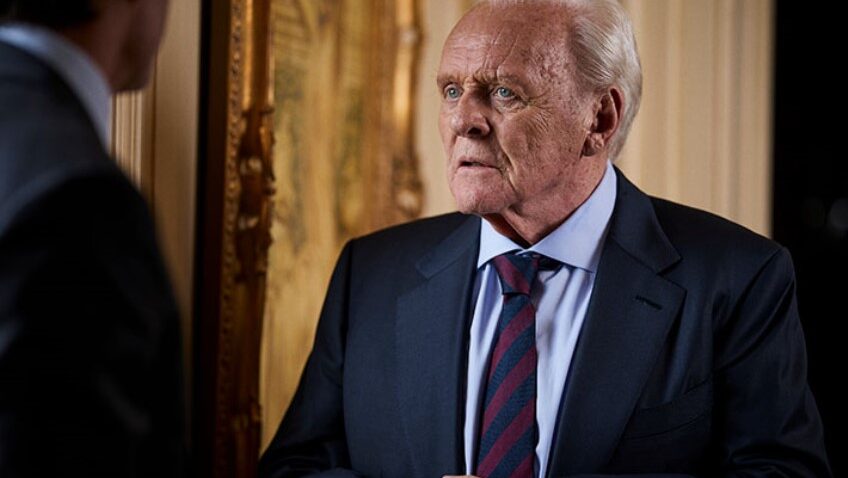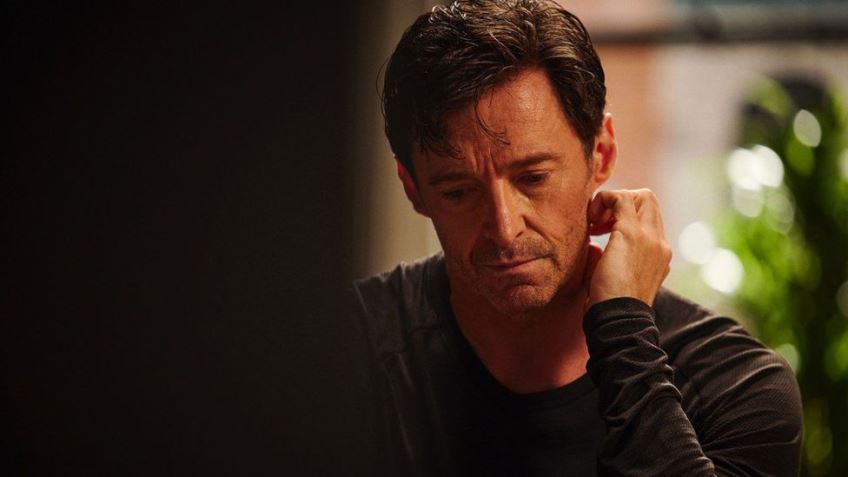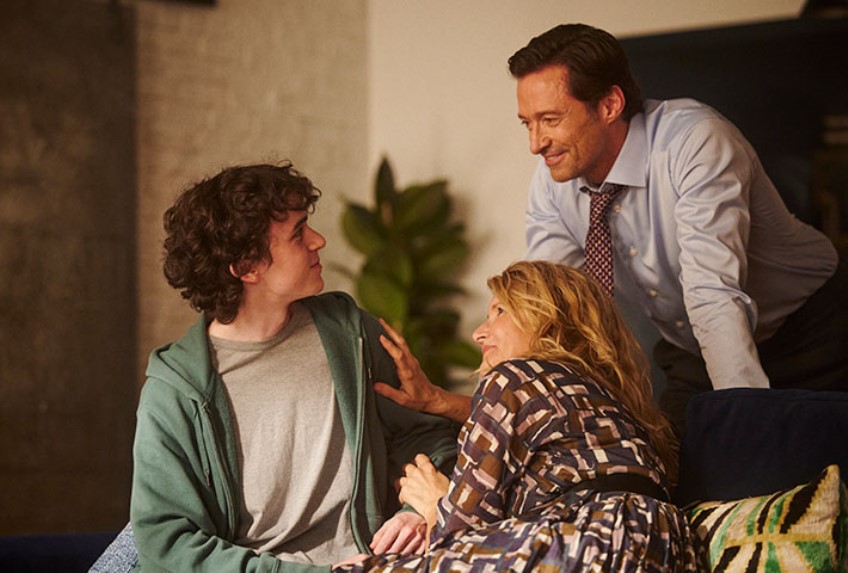Joyce Glasser reviews The Son (February 17, 2023) Cert 15, 123 mins.
When The Son opened in the theatre just before lockdown, it was compared unfavourably to The Father, the play that had everyone talking about French playwright Florian Zeller. But when, in 2021, Zeller turned out to be a natural film director with the screen version of The Father (the film winning an Academy Award for Best Adapted Screenplay), it was obvious he would renew the collaboration with scriptwriter Christopher Hampton for The Son. And with Anthony Hopkins winning the Best Actor Academy Award at 83 for The Father, Zeller had no problem attracting a cast that included 54-year-old Hugh Jackman, a prodigious, but to date Oscarless, talent.
In addition to casting the sublime Jackman, Vanessa Kirby (Pieces of a Woman), Laura Dern (Marriage Story, Blue Velvet) and Hopkins again in The Son, Zeller’s trump card is that he captures the zeitgeist. He draws us into his family dramas as interested parties. If Alzheimer’s was a hot topic when The Father appeared, teenage mental illness is even bigger, with everyone from tennis champions to Harry, Duke of Sussex and the Duke and Duchess of Cornwall, talking about it.
But Zeller isn’t interested in the disease so much as the impact it has on the family. There’s a “there but for the grace of God go I” engagement between the audience and the screen family which makes the films instantly relevant.
The plot is basic. Manhattan Highflyer Peter Miller is confident about bagging the job of a lifetime, an interview in Washington D.C. being just a formality. He is bolstered by his beautiful, much younger wife, Beth (Kirby), their new baby son and even by his ex-wife Kate (Dern) who has custody of their troubled, troublesome teenage son Nicolas (Zen McGrath). Nicholas will describe the divorce as painful, but, if only for Nicholas’s sake, Kate and Peter have an amicable, surprisingly close, relationship.
When the film begins this equilibrium is about to be shattered with everyone bungling through to the climactic explosion. An alarmed Kate tells Peter she needs his help. Nicholas has stopped going to school and he suddenly wants to live with his father.
Concerned and visibly angry at the news that Nicholas has been missing school – and that Kate just found out – Peter considers that maybe Nicholas needs his father around. He persuades Beth, and Nicholas moves into the spare room.
There is a scene in which Nicholas, in his history class, and Peter, being asked about his trip to Washington D.C. for a meeting with a senator, both tune out. Both are distracted by the anxiety that awaits them at home.
Beth is nervous alone with this troubled, unpredictable step-son, but does her best to be kind and inclusive. There is nonetheless a devastating scene in which Nicholas confronts her, blaming Beth for the break-up of his family.
Later Beth finds a knife in Nicholas’s room and Peter finds evidence of self-harm (Nicholas tells Peter that the knife eases the pain). In flashbacks, Peter remembers the good times, when Nicholas was a happy, loving little boy and he and Kate went on a sailing holiday. It’s as though Peter is trying to find the strength to reconnect with the son he still loves but is not getting through to.
A pattern sets in. Nicholas pretends all is well in school and that he is studying and even going to a dance. Peter becomes optimistic and makes plans. Nicholas is telling lies. Peter is at turns indulgent and strict, sympathetic and exasperated.
In case you are wondering where the shrink is, there is a shattering scene when Kate and Peter discuss Nicholas’s condition with a psychiatrist. They are forced to decide whether to leave Nicholas in the hospital for his own good or give in to their son’s entreaties to take him home. He promises that everything will change. You can empathise with the couple but might also be astonished at their naivety.
Nicholas’s character is not the only problem with the film. The way the script is written it would take a better actor than McGrath to make us feel any sympathy at all toward him. At 17, he is as needy as his baby brother, and everything he does is a way of attracting attention. We don’t so much feel his pain as have it shouted at us.
When Peter pleads with Nicholas to tell him what’s wrong so he can help, Nicholas says he does not know. But he does! He tells Kate, Beth and Peter that the upheaval of the divorce – and Peter’s treatment of Kate in particular – is the problem. He feels rejected like his mother. He wants his childhood security and happiness back. He also feels his father is forcing him to become like him professionally, just as Peter may have been coerced into his professional choice. There is less evidence of this.
But to arrive at this self-realisation is exactly why kids like Nicholas go to shrinks. If Nicholas already knows the source of his anguish, why is no one dealing with it in therapy? Thousands of children deal with these issues and get over them. Nicholas lives for revenge. How could anyone think it would be a good idea for Nicholas to move in with his rival – his new-born brother – and the usurper Beth?
Like Nicholas’s personality, the film has its ups and downs. The filmmakers and the fine actors drag us through the mill, leaving us exhausted from their trials. And good as they are, Anthony Hopkins blows them all out of the water with one intense scene, in which Peter, estranged from his tyrannical father, pays a visit to his mansion. Here, we are hit over the head with a key point of the film: that parenting can be passed down from father to son, and Peter should look in the mirror.
Zeller and Hampton devised an effective cinematic form to complement the content of The Father, shooting it from the point of view of the dementia sufferer. The Son, however, is played as stagey melodrama, and from a less emphatic point of view.
This might be intentional for it remains unclear who the titular son is. There are three sons in the film, (a fourth, if you catch Zeller’s step-son as an intern in Peter’s office) Peter’s new-born son can only be included in an abstract way. So we assume the titular son is Nicholas since he causes all the trouble. But Peter is in nearly every scene and the focus is on his actions and reactions. The scene with Hopkins and the powerful, haunting ending, is Peter’s P.O.W. This ambiguity is one of the reasons to see the film.






